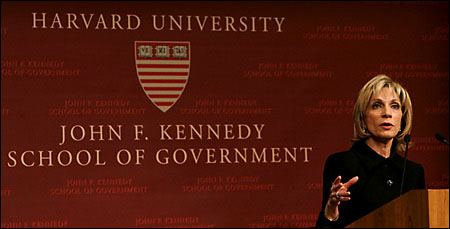NBC News correspondent slams government ‘handout press’

During a speech Tuesday night (March 22) at the Kennedy School, longtime NBC News correspondent Andrea Mitchell slammed fellow broadcasters for airing pre-packaged government “news” reports. Mitchell was honored with the Goldsmith Career Award for Excellence in Journalism during ceremonies at the John F. Kennedy Jr. Forum. “On issues from Medicare to farm prices, hundreds of local stations are running stories extolling Bush Administration policies, reaching tens of millions of people every day, but all of these reports were written and distributed by the administration itself and its public relations firms, not by journalists,” she said. “How did local news organizations reach the point where they think it is appropriate to fill their ever-expanding broadcasts with fake news scripted by the United States government?”Mitchell said the Bush Administration, while expanding practices begun under previous administrations, now spends a quarter of a billion dollars on public relations firms that produce pre-packaged news products. “We are all at risk when local news organizations or their cable news syndication providers … carry government video news releases without proper identification or verification,” she said. “The bottom line here is that no matter who produces these videos, broadcasting them is simply not ethical.”The problem, she stated, is that viewers often believe the content of the reports without having full acknowledgment of who produced them. Mitchell also mourned the loss of in-depth investigative and documentary reporting, saying it is “very expensive and not well supported” by corporate heads.Yet Mitchell commended those journalists, including the Goldsmith Award nominees in the audience, who continue producing high-quality news products that expose wrongdoing and government malfeasance. When asked about the competitive effects of cable news operations, Mitchell admitted that the American audience has more choices than ever as to where to get its information. “My concern is the public begins to get confused between news and conversation,” she said.As for the “most pressing problem” facing journalists in Washington, Mitchell pointed to the credibility of vital intelligence information. “The politicization of intelligence is perhaps the most alarming trend in recent years,” she said, referring to a combination of “incompetence and bad information being analyzed inexpertly.”The Goldsmith Awards presentation was sponsored by the Kennedy School’s Shorenstein Center on the Press, Politics and Public Policy.




